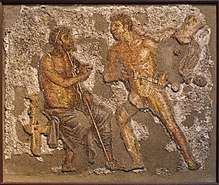Achilles
English
Etymology
Borrowed from Latin Achilles, from Ancient Greek Ἀχιλλεύς (Akhilleús).
Pronunciation
- (Received Pronunciation) IPA(key): /əˈkɪliːz/, /əˈkɪliz/
- IPA(key): /əˈkɪliːz/
Proper noun
Achilles
- (Greek mythology) A mythical semidivine hero, the son of Peleus by the nereid Thetis, and prince of the Myrmidons, who features in the Iliad as a central character and the foremost warrior of the Achaean (Greek) camp.
- 2005, P. J. Heslin, The Transvestite Achilles: Gender and Genre in Statius' Achilleid, Cambridge University Press, page 277,
- As we saw in the preceding chapter, Statius in the Achilleid revises the Ovidian account of Achilles′ rape of Deidamia.
- 2012, Richard Holway, Becoming Achilles: Child-Sacrifice, War, and Misrule in the Iliad and Beyond, Rowman & Littlefield (Lexington Books), page 153,
- In the last third of the Iliad, Achilles’ beloved companion, Patroklos, and his bitter enemy, Hektor, die wearing Achilles’ armor, their deaths prefiguring Achilles’ own.
- 2012, Marco Fantuzzi, Achilles in Love: Intertextual Studies, Oxford University Press, page 2,
- Iliad 1, in Maximus' interpretation, exemplifies a 'love contest' between an abusive and obsessive Agamemnon and a 'gentle and emotional' (ἥμερος καί ἐμπαθής) Achilles; […] .
- 2005, P. J. Heslin, The Transvestite Achilles: Gender and Genre in Statius' Achilleid, Cambridge University Press, page 277,
- (rare) A male given name.
- (astronomy) The Greek camp Trojan asteroid 588 Achilles.
Derived terms
Translations
Greek mythical hero
|
|
Further reading


Cebuano
Czech
Etymology
Dutch
Etymology
Borrowed from Latin Achilles, from Ancient Greek Ἀχιλλεύς (Akhilleús).
Pronunciation
- IPA(key): /ˌɑˈxɪ.ləs/
Audio (file) - Hyphenation: Achil‧les
Derived terms
- achillespees
Latin
Alternative forms
Etymology
Borrowed from Ancient Greek Ἀχιλλεύς (Akhilleús).
Pronunciation
- (Classical) IPA(key): /aˈkʰil.les/, [aˈkʰɪl.lɛs]
- (Ecclesiastical) IPA(key): /aˈkil.les/
audio (ecclesiastical) (file)
Inflection
Third declension.
| Case | Singular |
|---|---|
| Nominative | Achilles |
| Genitive | Achillis |
| Dative | Achillī |
| Accusative | Achillem |
| Ablative | Achille |
| Vocative | Achilles |
Derived terms
- Achillēus
- Achillīdes
References
- Achilles in Charlton T. Lewis and Charles Short (1879) A Latin Dictionary, Oxford: Clarendon Press
- Achilles in Charlton T. Lewis (1891) An Elementary Latin Dictionary, New York: Harper & Brothers
- Achilles in Gaffiot, Félix (1934) Dictionnaire Illustré Latin-Français, Hachette
Achilles in D. P. Simpson, Cassell's Latin Dictionary, Wiley Publishing, 1968
Polish
Etymology
Pronunciation
- IPA(key): /aˈxʲil.lɛs/
Audio (file)
Declension
declension of Achilles
| singular | |
|---|---|
| nominative | Achilles |
| genitive | Achillesa |
| dative | Achillesowi |
| accusative | Achillesa |
| instrumental | Achillesem |
| locative | Achillesie |
| vocative | Achillesie |
Portuguese
Etymology
Proper noun
Achilles m
- Obsolete spelling of Aquiles (used in Portugal until September 1911 and died out in Brazil during the 1920s).
Swedish
Etymology
Usage notes
- The classic Swedish translation of Homer's works by Erland Lagerlöf in 1912 uses this name form.
This article is issued from
Wiktionary.
The text is licensed under Creative
Commons - Attribution - Sharealike.
Additional terms may apply for the media files.
